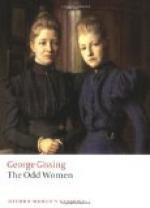‘Do I?’ The description pleased him; he laughed cheerfully. ’But I never found what my way was to be. I have always hated office work, and business of every kind; yet I could never see an opening in any other direction. I have been all my life a clerk—like so many thousands of other men. Nowadays, if I happen to be in the City when all the clerks are coming away from business, I feel an inexpressible pity for them. I feel I should like to find two or three of the hardest driven, and just divide my superfluous income between. A clerk’s life—a life of the office without any hope of rising—that is a hideous fate!’
‘But your brother got on well. Why didn’t he help you?’
‘We couldn’t agree. We always quarrelled.’
‘Are you really so ill-tempered?’
It was asked in Monica’s most naive tone, with a serious air of investigation which at first confused Widdowson, then made him laugh.
‘Since I was a lad,’ he replied, ’I have never quarrelled with any one except my brother. I think it’s only very unreasonable people that irritate me. Some men have told me that I was far too easy-going, too good-natured. Certainly I desire to be good-natured. But I don’t easily make friends; as a rule I can’t talk to strangers. I keep so much to myself that those who know me only a little think me surly and unsociable.’
‘So your brother always refused to help you?’
’It wasn’t easy for him to help me. He got into a stockbroker’s, and went on step by step until he had saved a little money; then he speculated in all sorts of ways. He couldn’t employ me himself— and if he could have done so, we should never have got on together. It was impossible for him to recommend me to any one except as a clerk. He was a born money-maker. I’ll give you an example of how he grew rich. In consequence of some mortgage business he came into possession of a field at Clapham. As late as 1875 this field brought him only a rent of forty pounds; it was freehold property, and he refused many offers of purchase. Well, in 1885, the year before he died, the ground-rents from that field—now covered with houses— were seven hundred and ninety pounds a year. That’s how men get on who have capital and know how to use it. If I had had capital, it would never have yielded me more than three or four per cent. I was doomed to work for other people who were growing rich. It doesn’t matter much now, except that so many years of life have been lost.’
‘Had your brother any children?’
’No children. All the same, it astonished me when I heard his will; I had expected nothing. In one day—in one hour—I passed from slavery to freedom, from poverty to more than comfort. We never hated each other; I don’t want you to think that.’
‘But—didn’t it bring you friends as well as comfort?’
‘Oh,’ he laughed, ’I am not so rich as to have people pressing for my acquaintance. I have only about six hundred a year.’




